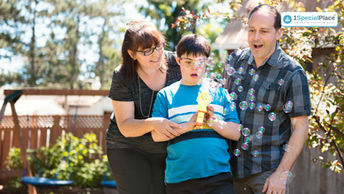All Posts


Jay's Success Story: From Silence to a Splash of Colours
Every success story begins quietly, often long before the world notices. Jay’s journey is one such story, shaped by patience, belief, and the power of allowing a child to grow at his own pace. From early developmental challenges to finding calm and confidence through art, Jay’s story is a reminder that progress does not always look the same but it is always meaningful. Here is an excerpt of his journey in his parents words. From Quiet Beginnings to Confident Creations: Jay’s
pratiksha26
4 min read
How Occupational Therapy Helps Children Thrive in Daily Life and Neurodiverse Development
As a parent, it can be deeply worrying when your child struggles with everyday tasks that seem effortless for others. Difficulty holding a pencil, avoiding certain textures, emotional meltdowns, poor attention, or challenges in school routines often leave parents feeling confused, anxious, and unsure of what support their child truly needs. This is where occupational therapy plays a critical role. Pediatric occupational therapy is not about fixing a child. It is about unders
Ankur Singh
4 min read


How Occupational Therapy Helps Improve Your Professional Life
How occupational therapy helps improve professional life, productivity, mental health, and physical well-being. Learn benefits, activities, examples, and what occupational therapy treats.
1SpecialPlace
4 min read


Autism Support Strategies for Children: Choice Making, Daily Routines, Preparation Skills & Understanding Stimming Behaviors
Supporting a child with Autism Spectrum Disorder (ASD) requires patience, planning, and an understanding of their unique ways of interacting with the world. From making choices to following routines, managing stims, and preparing for transitions, these strategies build independence, communication skills, and social competence. This comprehensive guide explores effective approaches to help children with ASD thrive in daily life and social situations. How to show support for au
1SpecialPlace
6 min read


Christmas Holiday Activities for Kids at Home
Christmas is a time of joy, togetherness, and celebration—but during times of social distancing, families often look for meaningful Christmas activities for kids at home that are fun, engaging, and developmentally enriching. The good news? Holiday moments can be turned into powerful learning opportunities, especially when activities are thoughtfully planned. From boosting speech and language skills to encouraging creativity, turn-taking, and emotional connection, these holid
1SpecialPlace
4 min read


Building Bonds Beyond Barriers – The Inspiring Journey of Buddy Up Founders, Gopika and Moneisha
In this month’s Success Story segment, we bring you a heartwarming story of friendship, resilience, and purpose. A journey led by two inspiring mothers who turned their personal challenges into a movement that celebrates connection and inclusion. Meet Gopika Kapoor and Moneisha Nagar , co-founders of Buddy Up , a unique social platform designed to help people with disabilities build friendships, communities, and a true sense of belonging. Their story is not just about creat
1SpecialPlace
7 min read
